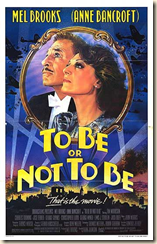 (1983)
(1983)
Directed by Alan Johnson
Written by Ronnie Graham and Thomas Meehan, based upon the 1942 screenplay by Edwin Justus Meyer, with story by Ernst Lubitsch and Melchior Lengyel,
Starring Mel Brooks, Anne Bancroft, Tim Matheson, Charles Durning, Christopher Lloyd, Jose Ferrer, Ronnie Graham, Jack Riley
IMDB Entry
The original To Be or Not to Be is something of a minor film classic now, but when it came out in 1942, it didn't do too well. It was Carole Lombarde's last film before her death in a plane crash and its star, Jack Benny, did not catch on in the films and, as a comedian, he joked about how bad his films were. In addition, director Ernst Lubitsch's idea for having a comedy of manners about Hitler in the middle of a war was considered in bad taste, and in worse taste once people discovered what Hitler was like. But, over the years, the film's reputation grew. It is a certainly a fine movie, with the touch of a director who believed that, if Hitler had bad manners, it meant he was capable of all sorts of monstrosities.
So when there was news that Alan Johnson, best known as an Emmy-winning choreographer, was directing a remake in 1982, it probably was considered by many to be the worst possible idea. Why remake a minor classic? And it's one thing to treat Hitler in a comedy of manners during the war, when we didn't know exactly what was going on in Germany, and quite another to do a light comedy like this now that we did know.
Enter Mel Brooks.
Brooks, of course, is known as a funnyman*. But Brooks had a serious side, even if it didn't show up in his films. Back in the early 80s, he set up Brooksfilms to do not only comedies, but some serious efforts such as The Elephant Man, Frances, and the remake of The Fly. So Brooks, who clearly had no problems poking fun at Hitler,** agreed to finance and star in the film. Even better, his wife, Anne Bancroft -- known for serious roles -- agreed to costar.
The film's opening sequence sets the scene nicely, with Frederick and Anna Bronski (Brooks and Bancroft) doing a duet on stage of "Sweet Georgia Brown."
Bronski is a legend in his own mind, a two-bit actor and producer who thinks he's the world's greatest actor. Anna, meanwhile, is busy having an affair with a handsome pilot Andre Sobinski (Tim Matheson) at the same time Bronski is onstage as Hitler, doing a satire on the dictator.
It all changes the next day, as Hitler invade Poland. Bronski works to smuggle out a Polish scientist as well as some local Jews and gays.***
The movie is funny as Bronski uses his Hitler impression to fool the Nazis**** and make the plan work. But there's also a serious subtext; this is more than just jokes. Lives are at stake and the horror of what the Nazis want to do is a constant thought in the back of our heads.
Brooks is at his best as Bronsky. Johnson manages to keep him from mugging and overacting more than necessary, making it one of his best comic performances. Bancroft is obviously having fun in his role, and the cast is filled with highly skilled comic actors who bring the whole thing off.*****
Alas, director Alan Johnson's career did not continue to direct. He work with Brooks and still continued choreography, winning another two Emmies, but despite this promising beginning, he only directed one more film, Solarbabies. Worse, when people do remember this film, they think that Brooks directed.
I think in many ways To Be or Not to Be is Brooks's best role, and shows that maybe he might have been a much funnier screen personality if he let other people direct him.
_____________________________________________
*I find that Brooks never was as good or important to comedy as his contemporary Woody Allen, and he ultimately fell behind the Zucker-Abrahams-Zucker combine, which took Brook's method and turbocharged it. The only fully satisfying comedy of his was Young Frankenstein (though Blazing Saddles and Silent Movie come close).
**Especially in springtime.
***This is one of Hollywood's first portrayals of homosexuals being part of those sent to the camps.
****It seems clear that Brooks's philosophy on Nazism is simple: they were fools and if we treat them like fools, people will laugh them away. It may be a better way to discredit them than to constantly say how bad they are; in fiction and elsewhere, one great way to create sympathy is to have people badmouth someone.
***** Of special note is Ronnie Graham, who helped write the screenplay, and also appears in the cast as the theater manager. Graham had a long list of writing and guest starring roles (especially in the TV version of M*A*S*H), but is best known to those of a certain age as Mr. Dirt in a commercial for Mobil gasoline.
No comments:
Post a Comment